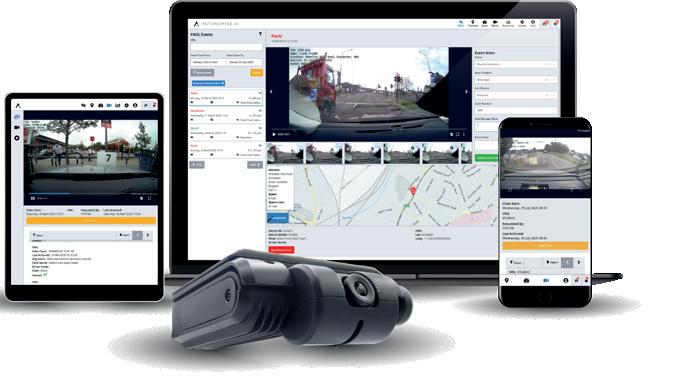5 minute read
Essential Fleet Manager - Issue1 (2023)
Welcome to issue 1(2023) of Essential Fleet Manager Magazine, published for fleet professionals who work for organisations that operate within the Essential Services Sector.
The magazine is available as a ‘free’ digital edition or can be delivered in ‘printed format’ for a paid subscription.
If you would like to feature your fleet operations in a future issue of Essential Fleet Manager - get in touch, we would love to work with you on highlighting your achievements.
For more information please email production@essentialfleetgroup.co.uk
Regards, Debbie Cheadle - Editor
12- 13 Winter Driving
The Fleet Interview: Rossendale Borough Council
Feature: Loading and Compliance
Venson provides Electric Vehicle owners with practical advice on keeping vehicles moving this Winter. 20 - 21
14 - 16 An interview with James Gunning, Workshop & Transport Services Manager. James explains how he is applying an innovative fuel solution to help reduce emissions.
Insight: CheckedSafe Vehicle compliance for all fleets.
08 - 09 Five Steps to Greener Transport Crown Commercial Service (CCS). 24 - 25 Safe Loading
By: Mark Cartwright Head of Commercial Vehicle Incident Prevention at National Highways.
Essential Fleet Manager Magazine is owned and published by: Essential Fleet Group Ltd I www.essentialfleetgroup.co.uk
The Essential Fleet Group Ltd’s other title is: Essential Fleet Operator Find all the latest Sector and Industry news on: www.myessentialfleet.co.uk
Follow Us: @FleetManager_UK
MAILING LIST & CIRCULATION
If you would like to join our digital mailing list please visit https://myessentialfleet.co.uk/essential-fleet-manager-magazine/ for further details.
FEATURES & EDITORIAL
To submit editorial or news for consideration to appear in Essential Fleet Manager, please send to: Debbie Cheadle I production@essentialfleetgroup.co.uk
22 - 23 Overloading
Understanding your van’s limits.
26
Legal Maintenance Standards - Trailers
Tim Ridyard, Partner Transport and Regulatory, Ashtons Legal.
ADVERTISING
If you would like a copy of the media pack for any of our titles please contact:
Mark Cheadle I mark@essentialfleetgroup.co.uk
The views expressed by contributors are not necessarily those of Essential Fleet Group Ltd. Every effort is made to ensure the content of Essential Fleet Manager Magazine is accurate. Information is published in good faith, but no responsibility can be accepted for loss or inconvenience arising from error or omission. Contributors must ensure that all material submitted is not in breach of copyright. While every care is taken with submitted material, no responsibility can be accepted for loss or damage.
Essential Fleet Group Ltd 128, City Road, London. EC1V 2NX Company Reg No: 12345195
All rights reserved. No part of this magazine may be reproduced in any form without prior permission from the copyright owner.
© Essential Fleet Group Ltd 2022

Funding for seven local highways authorities to develop and use new technologies to reduce emissions, improve regional connectivity and move to net-zero local roads.
Future roads could be built using asphalt made from grass cuttings and ‘carbon capturing’ cement, supported by £30 million government funding awarded to seven innovative, net zero projects.
Seven projects spread across the UK, from Lanarkshire to Devon, have been awarded funding today through the Live Labs 2: Decarbonising Local Roads competition. The programme supports projects led by local highways authorities focused on tackling the long-term decarbonisation of highways infrastructure, such as streetlights, and transforming local authorities’ approach to decarbonising roads.
The winning projects include cutting carbon emissions from our streetlights to producing asphalt made from green waste like grass cuttings. Other projects plan to drive changes to the design, construction and maintenance of typical UK highway construction, as well as plans to develop a first-of-its-kind system approach to creating a net carbon negative model for green infrastructure delivery.
Roads Minister Richard Holden said:
“The UK is a world leader in technology and innovation and we must use that strength to drive decarbonisation and the next generation of high tech jobs that go alongside it.
“We are supporting this vital agenda to help level-up through £30 million funding for ground-breaking projects and boosting regional connections to support growth.
“The government is determined to create good, well paid jobs – via innovation and investment across the UK – as we accelerate the road to net zero.”
The seven successful local highways authorities and their partners will be provided funding, subject to due diligence, to develop, test, pilot and roll out new technologies to facilitate decarbonisation, including in supply chain emissions. The seven successful bids are:
• Highways CO2llaboration Centre for materials decarbonisation, Transport for West Midlands: supporting upskilling and developing a team in the West Midlands to decarbonise highways via two initiatives, including a ‘Highways CO2llaboration Centre’, and demonstrator sites showcasing and monitoring innovative decarbonised highway materials
• UK Centre of Excellence for Material Decarbonisation in Local Roads, North Lanarkshire Council: creating a centre that will develop a materials testing programme identifying and deploying the latest tech for road construction, in addition to testing and deploying recycled materials from other industries to build roads

• A net carbon-negative model for green infrastructure management, South Gloucestershire Council and West Sussex County Council: aims to develop a first-of-its-kind approach to creating a net carbon negative model for building and delivering green infrastructure, for example recycling biomass from green waste
• A382 Carbon Negative Project, Devon County Council: aims to drive changes to the design, construction and maintenance in typical aspects of highway construction to reduce carbon emissions, and to build a new link road including walking and cycling options
• Ecosystem of Things, Liverpool City Council: aims to introduce an ‘Ecosystem of Things’, exploring a scalable and transferrable approach to understanding various systems (including design, public spaces, materials/process technology, recycling infrastructure and the legal, contractual and procurement processes) at city level to embed and adopt decarbonisation initiatives
• Decarbonising street lighting, East Riding of Yorkshire Council: plans to work on increasing efficiency for low carbon lighting to make sure they can still be clearly seen by drivers and to create a framework for an alternative manual for highway lighting, signing and road marking
• Net Zero Corridors, Wessex Partnership: will pioneer net zero roads that are built without creating more carbon emissions overall in Somerset, Cornwall, and Hampshire in 9 ‘net zero corridors’ linking rural and urban areas
Live Labs 2 is designed to ensure innovations are shared across the whole of the UK and bidders were encouraged to create partnerships across the public and private sector, and academia. As such, the winning projects will be working together across four interconnected themes, including:
• A green carbon laboratory: examining the role that nonoperational highways ‘green’ assets can play in providing a source of materials and fuels to decarbonise highway operations, for example, using biomass from green waste to create alternative fuels and asphalt additives
• A future lighting testbed: researching the future of lighting for local roads to determine what is needed in the future and how they can be further decarbonised
• A UK centre of excellence for materials: providing a centralised hub for research and innovation that would help test construction materials and their use
• Corridor and place-based decarbonisation: working to create decarbonisation across specific, wider regions and corridors covering both urban and rural areas
Live Labs 2 is funded by the Department of Transport (DfT) and organised by The Association of Directors of Environment, Economy, Planning & Transport (ADEPT), which represents ‘directors of place’ who are responsible for providing day-to-day services, such as local highways, as well as strategic long-term delivery.
This programme follows the previous and successful Live Labs 1, a £22.9 million innovation programme that focused on adoption of digital technology across the local roads sector in England.
“Tackling the carbon impact of our highways’ infrastructure is critical to our path to net zero but hard to address, so I am pleased that bidding was so competitive. Live Labs 2 has a huge ambition – to fundamentally change how we embed decarbonisation into our decision-making and to share our learning with the wider sector to enable behaviour change. Each project will bring local authority led innovation and a collaborative approach to create a long-lasting transformation of business as usual. I am looking forward to the opportunity to learn from our successful bidders and taking that into my own organisation.”
Mark Kemp, President of ADEPT







